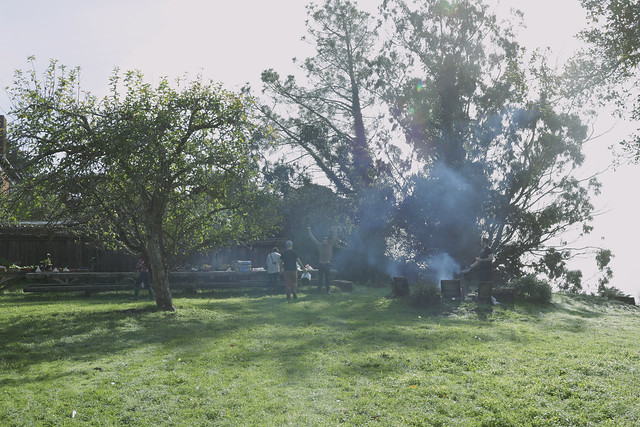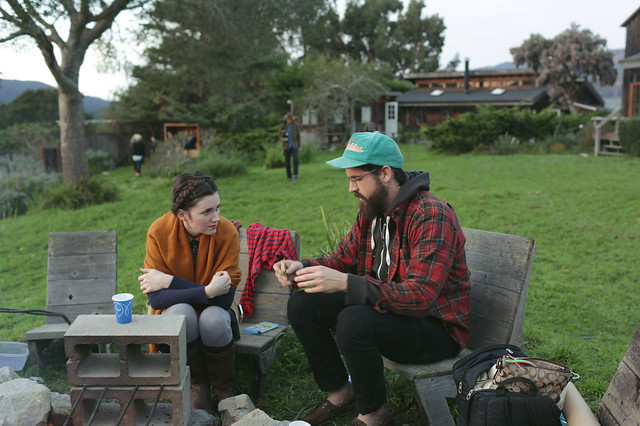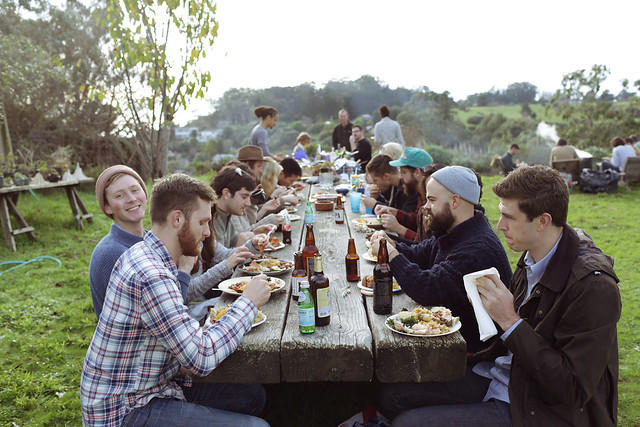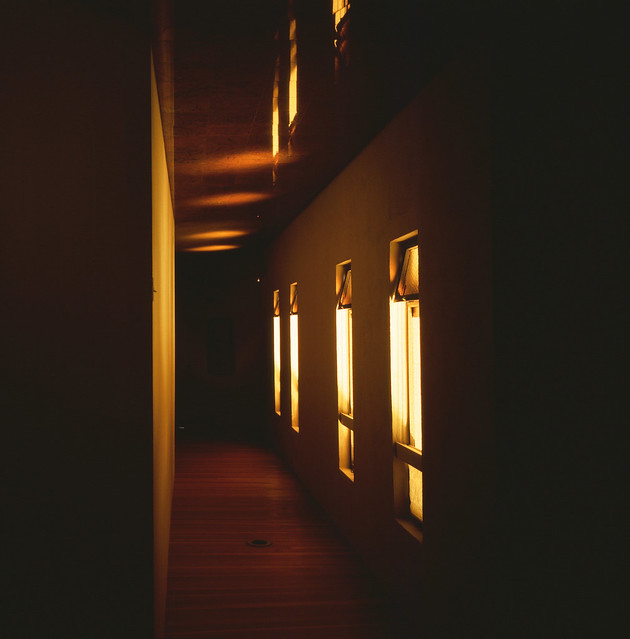I'll dig in,
into my days, having come here to live, not to visit. Grey is the price
of neighboring with eagles, of knowing
a mountain's vast presence, seen or unseen.
a mountain's vast presence, seen or unseen.
-Denise Levertov
"You're as stubborn as I am!" yelled a woman in an electric blue rain jacket, coming down the trail. We laughed and replied, "We are!" We thought we would be the only ones in Sutro Forest this morning, and for the most part, we were, except for this one woman, whose spirit (and resolve) was not unlike ours. We had parked the car and walked up just a few steps when we encountered the first demarcation of caution tape, wound haphazardly around two trees. "CAUTION. DO NOT ENTER" read the tape, blocking off the path, weakly urging you to turn around. Crys and I looked at each other, shrugged, and kept going without any debate, holding up the caution tape for one another as we slid underneath and into the forest. The caution was lost on us, mainly because we assumed that what might be a slippery inconvenience for most would be a private haven for us. And we're stubborn. I was adamant about hiking this morning, rain or shine, so we crossed at least three more of these barriers. At one point Crys peeled a slimy wet sheet of paper off my shoulder that said "Area closed. Do not enter." I must have swiped it as I ducked beneath the tape. We laughed and kept going.
The ground was muddy of course, reddish like terracotta. The logs were smooth and slick, cylinders perfectly shaped like musket barrels, rounded and dark and shiny. Not too far from the trailhead, a fallen tree lay, swathed in vine branches that hugged the trunk like a hundred serpentine limbs. The eucalyptus, we assumed, had been knocked over by the wind from the storm last week, whose intensity of the wind and water shook up the earth and the trees, compensating, like a long-lost lover, for its absence this year. Extreme begets extreme. The fallen trunk had split open, and now soggy with rainwater, the innards of the bark glowed a pale orange. From faraway, we could smell it. Crys bent down for a deeper whiff. "It smells like a candle," she said. Funny isn't it, how we try to bring wilderness into our homes instead of going out to it. The replica becomes the first point of contact, our access to the original: we first experience, if it can be called that at all, nature in a convenient, bottled and condensed form, as a reminiscence, a fragment, a purified remnant. Less wild, more domestic.
Sutro Forest, is of course, merely a remnant, a hundred-year-old, 80-acre forest first planted by Adolf Sutro, the remainder of the 1100 acres of eucalyptus trees that used to cover the western side of the city. Sutro Forest is strange and magical because of its location, an island of wilderness surrounded by an ocean of urbanity: asphalt, Victorian houses, cars parked parallel, and perpendicular streets around its perimeter, no buffer, really, between the wilderness and the city. But wander beyond the houses and up into the hills, and you will find yourself wandering not lonely as a cloud, but wandering through a cloud, in the majestic canopy of fog that hangs over the entire hill, the midair suspension of water droplets that enshrouds San Francisco even in the summer months, the dense thicket of vapor compacted into the spaces between trees, exhaling its breath through every turn of the city.
That Sutro Forest rests in the city's fog belt, wrapped up in a low-level cloud, creates a lush ecosystem that fosters abundant understory growth: mosses, lichens, ivy everywhere, Himalayan blackberry bushes, funguses growing like flecks of dandruff on the bare wet logs. Cloud forests, of which Sutro is one of the very few in the world, are also called "elfin forests," which, in a very impressionistic way, makes sense: the brush is so electrifyingly green, so layered with its histories of secrets, its dark crevices, its burrows, its passageways; there must be mystical creatures hiding out here somewhere.
A cloud forest is a self-sustaining ecosystem, a micro-climate whose life depends on its own watershed: the tree leaves first absorb moisture from the fog, then drip fog condensation down onto the ground, watering the plants and life below it. As you walk through Sutro forest, you are traversing multiple spheres, stratified into layers. The growth at your feet, new grasses and ivies, has just sprung up from the rain, among lithe branches and prehistoric ferns, dark and waxy. This field of green recalls a cushy, verdant Irish knoll; it is the color of life, the color of a blessed land, the color of sufficiency. Beyond the path on which you tread, you can hardly see any ground, for green overflows. It is as if the forest has finally awakened, and it awakens you with its abundant life. Your eyes move upward along the rigid trunks of the eucalyptus trees, and now you are in the clouds, which keep you here, rooted in this place. There is too much to see, and yet, the fog precludes your seeing beyond the forest. The fog is its own presence, not a disappearance of the things beyond it. This is a good thing because the forest contains itself, and it contains you in it. It holds all your attention today.
 Today it is raining, streams from the sky creating small streams on the ground. Everyone is hidden away inside their homes, but we have chosen the forest as our hiding place. We have chosen to dwell here this morning. In the city, the rain is made out to be an inconvenience, a hindrance, a barrier between you and the next place you need to go or the errand you need to run. But for a farmer or a gardener, rain is life, as it has been forever, a cleansing of the earth as well as a revival.
Today it is raining, streams from the sky creating small streams on the ground. Everyone is hidden away inside their homes, but we have chosen the forest as our hiding place. We have chosen to dwell here this morning. In the city, the rain is made out to be an inconvenience, a hindrance, a barrier between you and the next place you need to go or the errand you need to run. But for a farmer or a gardener, rain is life, as it has been forever, a cleansing of the earth as well as a revival.The other night, Crys, expressing her gratitude for the rain, said, "Our food comes from the earth, and the earth needs rain to live. So rain is life. We can't exist without it." This is the truth spoken by a woman who spends her mornings kneeling in the dirt, sifting out rocks and fallen fruit so that the soil is rich and pure, ready for new seeds. It would help us all to listen to those who move with the earth, who tend to its wildness. It would, perhaps, be salve to our wounds, to be more attentive to the life that springs from ground and reaches up into the fog, for in it, we see light and grace. We would know so surely that rain is, in fact, a way of grace, a gift that precedes our existence, and a gift upon which our existence depends. And if we understood that it was grace being poured down upon us, we would dance expectantly, pleading for rain, and dance again when it came. For when it rains, the ground, the flora, the eucalyptus trees, the mushrooms, and the grasses are as they should be, joyful, exuberant, teeming with life. Growing upward, shooting sprouts, revealing new leaves. We, walking through Sutro Forest on this rainy day, rejoiced with the rain, celebrated the way it resuscitates, resurrects, revives. Among us there was no silence, though we did not speak or clamor; life, even what was invisible, even what we could not see or grasp or understand, was singing a hymn, saying over and over again, amazing grace, how sweet the sound.
The sun had come up brilliantly after a heavy rain, and the trees were glistening and very wet. On some impulse, plain exuberance, I suppose, the fellow jumped up and caught hold of a branch, and a storm of luminous water came pouring down on the two of them, and they laughed and took off running, the girl sweeping water off her hair and her dress as if she were a little bit disgusted, but she wasn’t. It was a beautiful thing to see, like something from a myth. I don’t know why I thought of that now, except perhaps because it is easy to believe in such moments that water was made primarily for blessing, and only secondarily for growing vegetables or doing the wash. I wish I had paid more attention to it. My list of regrets may seem unusual, but who can know that they are, really. This is an interesting planet. It deserves all the attention you can give it.
-Marilynne Robinson, Gilead

















